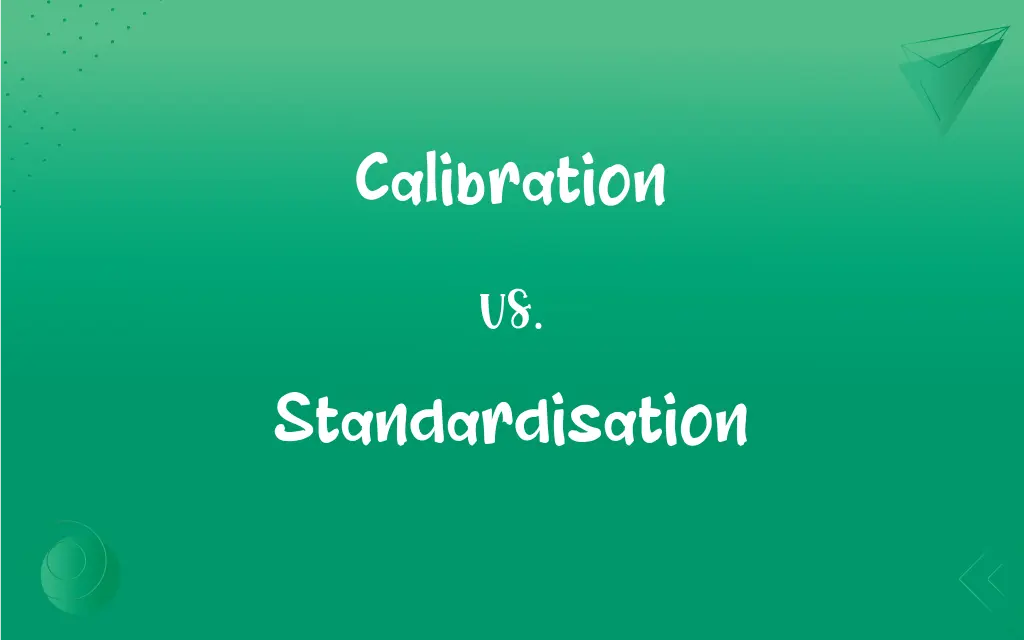Calibration vs. Standardisation: What's the Difference?
Edited by Harlon Moss || By Janet White || Updated on October 19, 2023
"Calibration" adjusts tools to ensure accuracy against standards, while "Standardisation" makes systems uniform for consistency and reliability.

Key Differences
"Calibration" involves adjusting the performance of a device or instrument to ensure its readings match the values of a known standard. This process is essential to maintain the accuracy of instruments over time, particularly those used in critical measurements. In contrast, "Standardisation" is the process of implementing and developing technical standards to establish uniformity and consistency in different fields, ensuring that products and methods are fit for their purpose.
Instruments undergoing "calibration" are checked against known standards, such as weights, measures, or specific physical constants, to correct deviations. This ensures that an instrument accurately reflects the true value. "Standardisation," however, is less about accuracy and more about consistency. It ensures that different products or processes of a similar type will function identically, meet common standards, and maintain compatibility or interoperability.
"Calibration" is a routine process that must be conducted regularly to maintain the accuracy of measuring instruments, as their performance can drift over time. This is crucial in industries where precise measurements are vital, such as healthcare, manufacturing, and aviation. On the other hand, "Standardisation" applies to systems at a broader level, seeking to achieve uniformity and efficiency across entire industries or fields of study, thus facilitating trade, innovation, and productivity.
While "calibration" typically requires specialized equipment and trained personnel to compare device outputs against known standards, "standardisation" involves consensus-building among stakeholders to agree upon consistent methods and criteria. Standardisation can lead to the creation of international standards, which transcend national boundaries and facilitate global commerce, communication, and cooperation.
In a broader sense, "calibration" ensures that devices operate accurately within established systems, contributing to the reliability and integrity of data or output. In contrast, "standardisation" establishes the systems themselves, creating the frameworks within which such devices operate, ensuring consistency and reliability across the board.
ADVERTISEMENT
Comparison Chart
Purpose
Accuracy of instruments
Consistency in systems
Process
Adjustment to known standards
Implementing uniform standards
Scope
Specific instruments
Industry-wide or global
Frequency
Regular intervals
As needed for uniformity
Focus
Precision and reliability
Compatibility and interoperability
ADVERTISEMENT
Calibration and Standardisation Definitions
Calibration
The correction of deviations in an instrument's readings.
Through calibration, we corrected the minor errors the thermometer was displaying.
Standardisation
Establishment of technical specifications ensuring reliability and compatibility.
The standardisation of smartphone chargers simplified consumer use.
Calibration
The process of adjusting an instrument to match standard values.
The calibration of the scale ensured its readings were accurate.
Standardisation
Harmonization of different criteria or specifications.
The standardisation of health protocols enhanced patient care universally.
Calibration
A check for accuracy against known standards.
Regular calibration is essential for maintaining the precision of measuring devices.
Standardisation
The process of making something conform to a standard.
Standardisation of procedures improved efficiency across departments.
Calibration
The alignment of measurement tools with industry standards.
The laboratory emphasized the importance of calibration in their research accuracy.
Standardisation
The implementation of an agreed-upon method or approach industry-wide.
Through standardisation, companies were able to adopt a unified software platform.
Calibration
A comparison between measurements – one of known magnitude and one made with the instrument.
The calibration process was stringent, comparing outputs with established benchmarks.
Standardisation
The process of ensuring that methods, performances, or products are consistent.
Standardisation was crucial for maintaining quality control in production.
Calibration
The act or process of calibrating or the state of being calibrated.
Standardisation
(British spelling) standardization.
Calibration
A gradation that shows a position or value, as on a measuring instrument.
Standardisation
The condition in which a standard has been successfully established;
Standardization of nuts and bolts had saved industry millions of dollars
Calibration
Calibrations A set of such gradations
The calibrations on a pressure gauge.
Standardisation
The imposition of standards or regulations;
A committee was appointed to recommend terminological standardization
Calibration
The act of calibrating something.
Standardisation
The act of checking or adjusting (by comparison with a standard) the accuracy of a measuring instrument;
The thermometer needed calibration
Calibration
The process of estimating the caliber a tube, as of a thermometer tube, in order to graduate it to a scale of degrees; also, more generally, the determination of the true value of the spaces in any graduated instrument.
Calibration
The act of checking or adjusting (by comparison with a standard) the accuracy of a measuring instrument;
The thermometer needed calibration
FAQs
What is calibration primarily used for?
To maintain the accuracy of measuring instruments.
Can standardisation apply to services?
Yes, it ensures uniform quality and expectations.
What can happen if calibration is neglected?
Measurement inaccuracies and compromised data integrity.
What types of instruments require calibration?
Measuring tools, medical equipment, and quality control devices.
How often should instruments be calibrated?
Regularly, based on manufacturer recommendations or usage intensity.
Why is standardisation important?
It ensures consistency, compatibility, and efficiency.
What professions regularly rely on calibration?
Scientists, engineers, and healthcare professionals.
What are the goals of standardisation?
Uniformity, interoperability, and quality assurance.
Are there international standards for calibration?
Yes, many countries follow ISO standards.
Is standardisation mandatory?
It can be, especially for safety, health, and international trade.
Does standardisation stifle innovation?
Not necessarily; it can actually foster innovation within a consistent framework.
What's a primary consequence of poor calibration?
Inaccurate data that can lead to faulty conclusions.
Can calibration affect product quality?
Yes, accurate measurements are crucial to quality control.
What is the role of calibration in safety?
It ensures devices accurately detect or measure safety-related parameters.
What industries heavily rely on standardisation?
Tech, manufacturing, healthcare, and many more.
What is a standard in the context of standardisation?
An established norm or requirement in a specific area.
Who benefits from standardisation?
Industries, consumers, and global trade sectors.
How does standardisation affect global trade?
It simplifies and facilitates international transactions.
Can standardisation improve customer satisfaction?
Yes, by ensuring consistent product/service quality.
Can I perform calibration myself?
Only if trained; otherwise, professionals should.
About Author
Written by
Janet WhiteJanet White has been an esteemed writer and blogger for Difference Wiki. Holding a Master's degree in Science and Medical Journalism from the prestigious Boston University, she has consistently demonstrated her expertise and passion for her field. When she's not immersed in her work, Janet relishes her time exercising, delving into a good book, and cherishing moments with friends and family.
Edited by
Harlon MossHarlon is a seasoned quality moderator and accomplished content writer for Difference Wiki. An alumnus of the prestigious University of California, he earned his degree in Computer Science. Leveraging his academic background, Harlon brings a meticulous and informed perspective to his work, ensuring content accuracy and excellence.































































